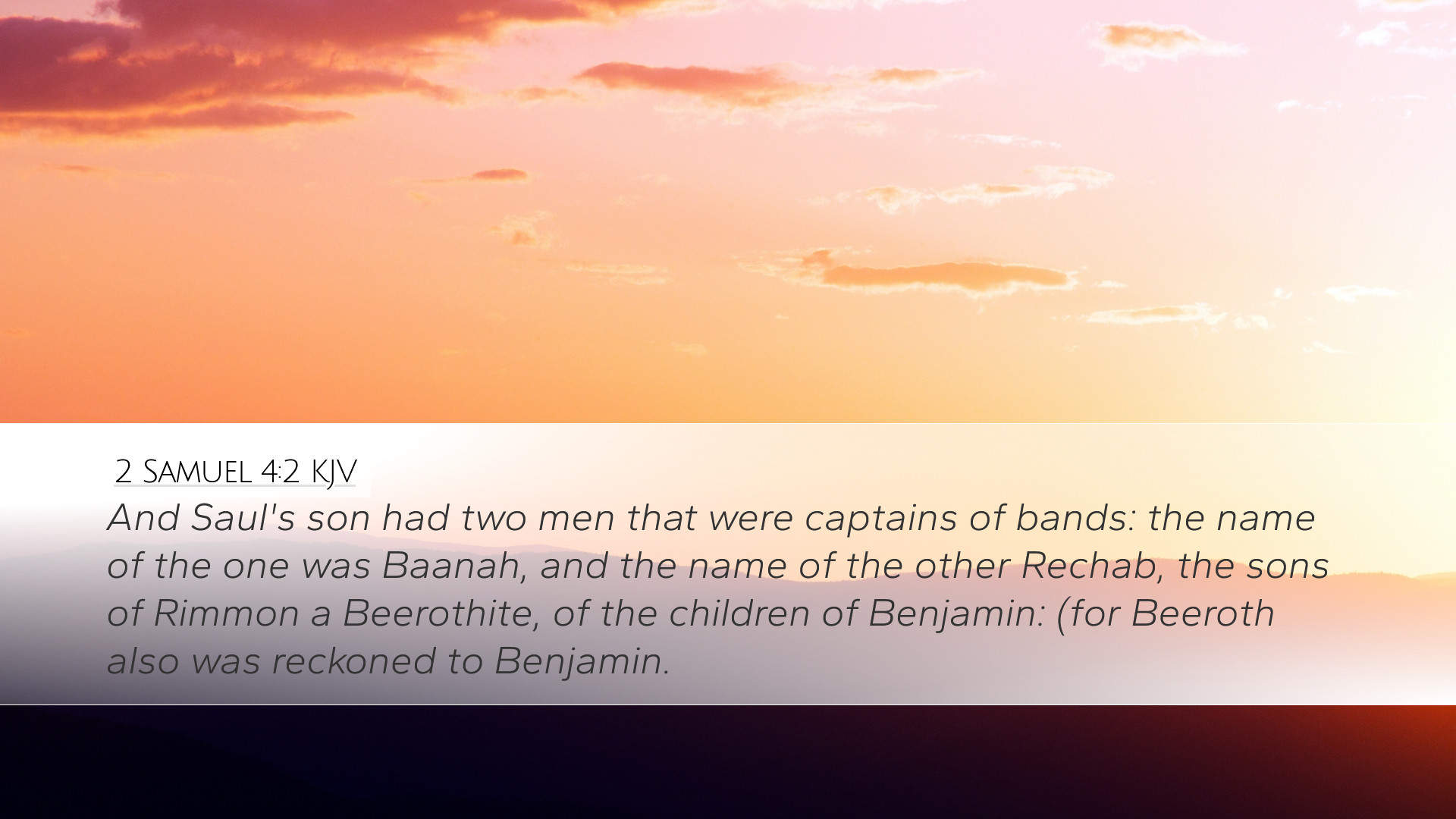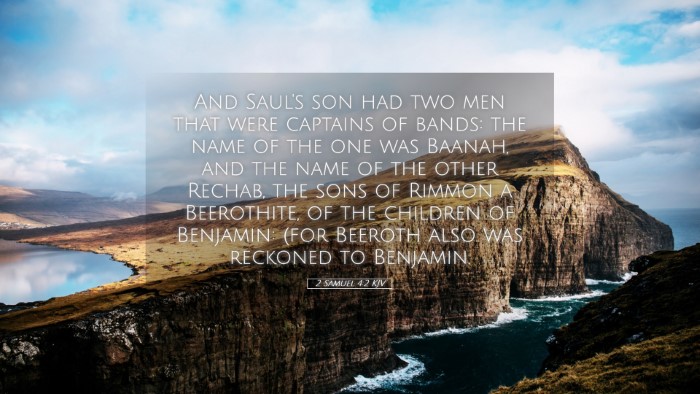Old Testament
Genesis Exodus Leviticus Numbers Deuteronomy Joshua Judges Ruth 1 Samuel 2 Samuel 1 Kings 2 Kings 1 Chronicles 2 Chronicles Ezra Nehemiah Esther Job Psalms Proverbs Ecclesiastes Song of Solomon Isaiah Jeremiah Lamentations Ezekiel Daniel Hosea Joel Amos Obadiah Jonah Micah Nahum Habakkuk Zephaniah Haggai Zechariah Malachi2 Samuel 4:2
2 Samuel 4:2 KJV
And Saul's son had two men that were captains of bands: the name of the one was Baanah, and the name of the other Rechab, the sons of Rimmon a Beerothite, of the children of Benjamin: (for Beeroth also was reckoned to Benjamin.
2 Samuel 4:2 Bible Commentary
Commentary on 2 Samuel 4:2
2 Samuel 4:2 states: "And Saul’s son had two men that were captains of bands: the name of the one was Baanah, and the name of the other Rechab, the sons of Rimmon a Beerothite, of the children of Benjamin: for Beeroth also was reckoned to Benjamin."
Context and Historical Background
The verse occurs during a tumultuous period in Israel's history, immediately following the death of King Saul and after the rise of David as a leader. It highlights the complex political dynamics as various factions vie for power.
In this setting, Saul's son, Ishbosheth, who becomes an adversary to David, is mentioned, indicating ongoing conflict and division within the nation of Israel. The verse identifies key military leaders, Baanah and Rechab, whose actions become pivotal in the unfolding narrative.
Insights from Commentaries
Matthew Henry
Matthew Henry describes the significance of the verse within the broader narrative of the struggle for the Israelite throne. According to Henry, the mention of the captains, Baanah and Rechab, illustrates the potential for treachery as they serve under Ishbosheth, Saul's son. This foreshadows the events that will lead to Ishbosheth's downfall.
Henry emphasizes the detail about Beeroth being considered part of Benjamin, highlighting geographical and tribal complexities, given that Beeroth itself was often a place of political intrigue. He posits that this underlines the loyalty and enmity that characterized the relationships between Saul's lineage and David's rise.
Albert Barnes
Albert Barnes focuses on the identities and backgrounds of Baanah and Rechab. He notes that their mention as captains reflects the military organization's influence on the power struggle. Barnes interprets their roles as crucial in the context of Israel's divided allegiance between the house of Saul and David.
Particularly, Barnes highlights the strategic positioning of Benjamin within Israel's tribal structure and the implications of such affiliations in political maneuvers. He discusses how Baanah and Rechab's allegiance might reflect a desire for personal advancement at the expense of loyalty to their king, setting the stage for subsequent betrayal.
Adam Clarke
Adam Clarke provides an analytical approach to the historical and geographical references in this verse. He explains the significance of Beeroth, aligning it with Benjamite districts which were often embroiled in conflict due to their association with Saul. Clarke also elaborates on the character of the captains, noting that their bravery and ambition play into the larger narrative of David's eventual rule.
Clarke warns readers of the dangers of ambition without loyalty, reflecting on how Baanah and Rechab's motivations can mirror the moral failings in leadership throughout history. He encourages readers to consider the implications of their choices and the often-fickle nature of human allegiance.
Theological Implications
This verse presents several theological themes suitable for reflection among pastors, students, and scholars:
- The Nature of Leadership: The contrast between the leadership styles of Saul and David becomes evident through the actions of their respective followers.
- Divine Sovereignty: The unfolding events hint at God's sovereign hand in establishing David as king, as well as the fragility of human power.
- Loyalty and Treachery: The behavior of Baanah and Rechab signifies the tensions between loyalty and personal ambition, reminding us of the moral complexities in leadership and power struggles.
- Tribal Dynamics: The roots of the conflict can be traced back to tribal loyalties, which challenges modern readers to examine their own allegiances within community structures.
Conclusion
2 Samuel 4:2 may seem a mere historical note, yet it opens up profound questions about authority, loyalty, and the pursuit of power. The mention of Baanah and Rechab, along with the context of their captaincy, prepares readers for the critical events that will shape Israel’s monarchy. By digging into the insights from historical commentaries, we find a rich tapestry of theological reflection that remains relevant for contemporary faith and leadership.


